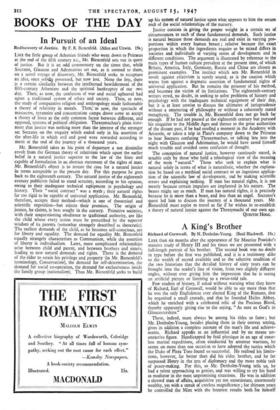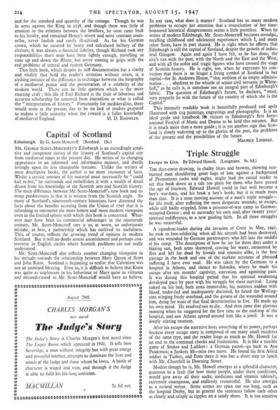A King's Brother
Richard of Cornwall. By N. Denholm-Young. (Basil Blackwell. 15s.) LESS than six months after the appearance of Sir Maurice Powicke's massive study of Henry III and his times we are presented with a full-length portrait of his brother. The second book was no doubt in type before the first was published, and it is a testimony alike to the wealth of record available and to the selective erudition of the two historians that the detailed history of sixty years can be brought into the reader's line of vision, from two slightly different angles, without ever giving him the impression that he is seeing an artificial picture or listening to a twice-told tale.
Few readers of history, if asked without warning what they knew of Richard, Earl of Cornwall, would be able to say more than that he was the only Englishman ever elected King of the Romans, that he organised a small crusade, and that he founded Hailes Abbey, which he enriched with a celebrated relic of the Precious Blood, thereby apparently giving rise to the saying, " As sure as God's in Gloucestershire."
These, indeed, must always be among his titles to fame ; but Mr. Denholm-Young, besides placing them in their correct setting, gives in addition a complete account of the man's life and achieve- ments. Richard appeds as an influential and by no means un- attractive figure. Handicapped by frail physique in an age of cease- less martial expeditions, often conducted by amateur warriors, he seems on more than one occasion to have adopted the tactics which the Duke of Plaza Toro found so successful. He realised his limita- tions, however, far better than did his elder. brother, and he far surpassed Henry in the"arts of diplomacy and the more noble task of peace-making. For this, so Mr. Denhohn-Young tells us, he had a talent approaching to genius, and was willing to try his ;land as mediator in the most unpromising situations. He was in addition a shrewd man of affairs, acquisitive yet not extortionate, enormously wealthy, yet with a streak of careless magnificence ; for thirteen years he controlled the Mint with the happiest results both for himself and for the standard and quantity of the coinage. Though he was in arms against the King in .1238, and though there was little of emotion in the relations between the brothers, he soon came back to his loyalty, and remained Henry's wisest and most constant coun- sellor, never foolish and rarely ill-advised. As for his German crown, which he secured by heavy and calculated bribery of the electors, it was always a financial liability, though Richard took any responsibilities there may have been lightly enough, travelling in state up and down the Rhine, but never coming to grips with the real problems of central and eastern Germany.
This little book, which despite its stiff documentation has a clarity and vitality that hold the reader's attention without strain, is a striking instance of the difference in technique between the biography of a mediaeval prince and the presentation of a celebrity of the modern world. There can be little question which is the more exacting craft ; this life of Earl Richard is the fruit of laborious and accurate scholarship far removed from journalism or what is called the "interpretation of history." Fortunately for mediaevalists, there would seem at the present day to be no lack of readers prepared to endure a little austerity when the reward is a fuller knowledge



































 Previous page
Previous page